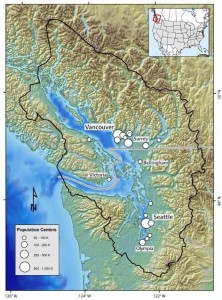
The Salish Sea stretches from halfway up Vancouver Island to Olympia, with the San Juan Islands at its heart.
A new research paper, just published in the international journal EcoHealth, finds that a major principle for restoring ecosystems is lacking in efforts to restore the health of Puget Sound.
“Efforts to save Puget Sound must revolve around a working principle that ecosystems do not recognize political borders. To save Puget Sound, the U.S. and Canada must work together much more closely than is currently practiced,” said Joe Gaydos, the study’s lead author. Gaydos is Chief Scientist and Regional Director of the SeaDoc Society, a non-profit organization that funds science to improve the health of the Salish Sea. The Salish Sea is a name often used for the U.S./Canadian inland sea that includes Washington’s Puget Sound and British Columbia’s Georgia Strait.
“While there is some coordination between U.S. and Canadian initiatives to heal the Salish Sea, it is not nearly enough. The international political boundary is invisible to marine fish and wildlife, including species listed as threatened or endangered” Gaydos said. “Oceanographic processes, such as freshwater from rivers and streams, and currents exchange plankton, sediments, and nutrients throughout the entire ecosystem, not just Puget Sound.” Gaydos noted that Canada’s Fraser River is Puget Sound’s largest source of fresh water.
“Our salmon and our whales are your salmon and your whales,” added Jane Watson, Marine Ecologist at Vancouver Island University and one of the SeaDoc Society’s Science Advisors. “We cannot change the nature or boundaries of the ecosystem but with improved cooperation and bilateral commitment, we can jointly recover imperiled species and clean up the water.”
Millions of dollars have been spent on restoring places like the Chesapeake Bay and the Everglades, but the success has been limited and there is not a successful model to follow. In addition to calling for coordinated initiatives at the ecosystem level, the paper calls out nine other critical principles that need to be followed to design a healthy Puget Sound and Salish Sea.
These include: accounting for connectivity in the ecosystem, better understanding the food web, avoiding habitat fragmentation, respecting the integrity of the system, taking actions that support resilience, appreciating the economic value of a healthy ecosystem, monitoring wildlife health, planning for extreme events and sharing our knowledge about the ecosystem with everyone in the region.
A copy of the manuscript is available at www.seadocsociety.org.
The SeaDoc Society works to ensure the health of marine wildlife and their ecosystems through science and education. A program of the Wildlife Health Center at the University of California, Davis (UC Davis), the SeaDoc Society has a regional focus on improving the health of the Salish Sea.
**If you are reading theOrcasonian for free, thank your fellow islanders. If you would like to support theOrcasonian CLICK HERE to set your modestly-priced, voluntary subscription. Otherwise, no worries; we’re happy to share with you.**






